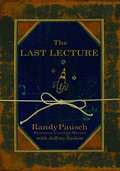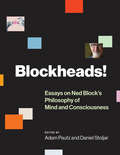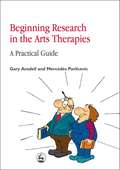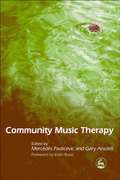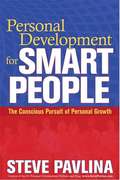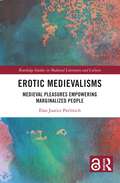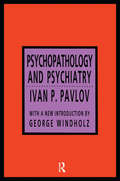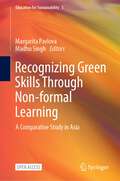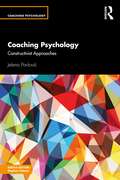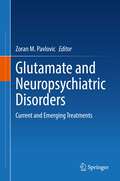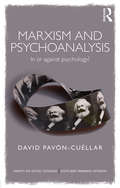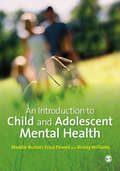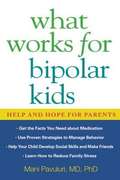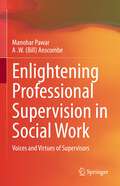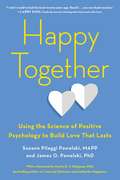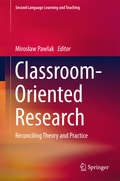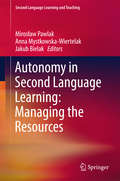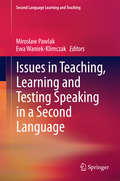- Table View
- List View
Trauma and Trauma Consequence Disorder: In Media, Management and Public
by Markus J. Pausch Sven J. MattenThis companion offers solutions for coping with anxiety as well as psychological trauma and post-traumatic stress disorder with a special focus on the target group of exposed persons who are active in management, the media or in the public in general and are thus exposed to particularly strong observation and evaluation by their environment. This work explains and supports how this can be dealt with constructively and perhaps even used as a competitive advantage as well as overcome fears and regain personal happiness.
Trauma und Traumafolgestörung
by Markus J. Pausch Sven J. MattenDieses Buch bietet Lösungsansätze zur Angstbewältigung sowie bezüglich psychologischer Traumata und posttraumatischer Belastungsstörung mit besonderem Fokus auf die Zielgruppe exponierter Personen, die in Management, Medien oder allgemein in der Öffentlichkeit tätig sind und dadurch einer besonders starken Beobachtung und Bewertung durch ihr Umfeld ausgesetzt sind. Wie damit konstruktiv umgegangen werden kann und dies vielleicht sogar als Wettbewerbsvorteil genutzt sowie überwunden und persönliches Glück wiedererlangt werden kann, erläutert und unterstützt das vorliegende Werk.
The Last Lecture
by Randy PauschWhen they retire, many professors give talks titled "The Last Lecture" where they speak about what they view as their legacy. When Pausch was diagnosed with terminal cancer, the lecture he gave, "Really Achieving Your Childhood Dreams," wasn't about dying. It was about the importance of overcoming obstacles, of enabling the dreams of others, of seizing every moment because "time is all you have ...and you may find one day that you have less than you think."
Blockheads!: Essays on Ned Block's Philosophy of Mind and Consciousness (The\mit Press Ser.)
by Adam Pautz Daniel StoljarNew essays on the philosophy of Ned Block, with substantive and wide-ranging responses by Block.Perhaps more than any other philosopher of mind, Ned Block synthesizes philosophical and scientific approaches to the mind; he is unique in moving back and forth across this divide, doing so with creativity and intensity. Over the course of his career, Block has made groundbreaking contributions to our understanding of intelligence, representation, and consciousness. Blockheads! (the title refers to Block's imaginary counterexample to the Turing test—and to the Block-enthusiast contributors) offers eighteen new essays on Block's work along with substantive and wide-ranging replies by Block. The essays and responses not only address Block's past contributions but are rich with new ideas and argument. They importantly clarify many key elements of Block's work, including his pessimism concerning such thought experiments as Commander Data and the Nation of China; his more general pessimism about intuitions and introspection in the philosophy of mind; the empirical case for an antifunctionalist, biological theory of phenomenal consciousness; the fading qualia problem for a biological theory; the link between phenomenal consciousness and representation (especially spatial representation); and the reducibility of phenomenal representation. Many of the contributors to Blockheads! are prominent philosophers themselves, including Tyler Burge, David Chalmers, Frank Jackson, and Hilary Putnam.ContributorsNed Block, Bill Brewer, Richard Brown, Tyler Burge, Marisa Carrasco, David Chalmers, Frank Jackson, Hakwan Lau, Geoffrey Lee, Janet Levin, Joseph Levine, William G. Lycan, Brian P. McLaughlin, Adam Pautz, Hilary Putnam, Sydney Shoemaker, Susanna Siegel, Nicholas Silins, Daniel Stoljar, Michael Tye, Sebastian Watzl
Reasons and Intentions in Law and Practical Agency
by George Pavlakos Veronica Rodriguez-BlancoThis collection of new essays explores in depth how and why we act when we follow practical standards, particularly in connection with the authority of legal texts and lawmakers. The essays focus on the interplay of intentions and practical reasons, engaging incisive arguments to demonstrate both the close connection between them, and the inadequacy of accounts that downplay this important link. Their wide-ranging discussion includes topics such as legal interpretation, the paradox of intention, the relation between moral and legal obligation, and legal realism. The volume will appeal to scholars and students of legal philosophy, moral philosophy, law, social science, cognitive psychology, and philosophy of action.
The Bilingual Mind
by Aneta PavlenkoIf languages influence the way we think, do bilinguals think differently in their respective languages? And if languages do not affect thought, why do bilinguals often perceive such influence? For many years these questions remained unanswered because the research on language and thought had focused solely on the monolingual mind. Bilinguals were either excluded from this research as 'unusual' or 'messy' subjects, or treated as representative speakers of their first languages. Only recently did bi- and multilinguals become research participants in their own right. Pavlenko considers the socio-political circumstances that led to the monolingual status quo and shows how the invisibility of bilingual participants compromised the validity and reliability of findings in the study of language and cognition. She then shifts attention to the bilingual turn in the field and examines its contributions to the understanding of the human mind.
Groups in Music: Strategies from Music Therapy
by Mercedes PavlicevicMusic in Groups happens all the time: in the street, the classroom, in music colleges, community centres, hospitals, prisons, churches and concert halls; at raves, weddings, music festivals, public ceremonies, music therapy sessions, group music lessons, concerts and rehearsals. Some group musicking seems to 'work' (and play) better than others; some sessions feel exhausting even if things are going well; and at other times, we can't begin to explain the complex musical and relational textures of group music work to funders, employers, friends, colleagues, or line managers. In this book, music therapist Mercédès Pavlicevic develops a broad-based discourse to describe, analyse and guide the practice of group musicking, drawing on her own extensive experience. The text is illustrated with vignettes drawn from a range of formal and informal settings that include spontaneous public occasions, collective rituals, special and mainstream education, music therapy, the concert hall, the music appreciation group and community work. This book makes you think about balancing individual and group needs, the development of group time, dealing with over-enthusiastic performers who 'hog' the group sound, undercurrents in music groups, the complications of dealing with institutions, preparing music listening programmes and buying instruments for group work - if you're involved in any kind of group musicking, this book is for you.
Beginning Research in the Arts Therapies: A Practical Guide
by Mercedes Pavlicevic Gary Ansdell* Are you about to write a dissertation for an MA in an arts therapy? * Is your workplace pressuring you to do research on your practice? * Do you fancy trying your hand at a bit of research without any pressure from anyone? * Are you bewitched, bothered and bewildered? A mystique about research usually comes from reading a) writers who launch into philosophical dialectics about research and avoid the basics; b) poorly written research papers full of undecipherable formulae; and c) smug, unfriendly research texts. This book begins at the beginning. Ansdell and Pavlicevic hold your hand and give you plenty of hints and tips while you prepare your funding proposal or research project. They help you think about your title, structure your research questions and aims, and prepare to collect, organize and analyze your research data. Moreover, you're not alone! Franz and Suzie have their own projects which you're invited to follow with opportunities to learn about the nitty-gritty of tables, pie-charts, data transcription, data presentation - and supervisors who toss off clever, useless bits of advice. `Beginning Research in the Arts Therapies' puts the zap into arts therapies research, making it fun and serious, exasperating and utterly absorbing. Miss this book and you'll deprive yourself of a sympathetic ear, firm advice and a sensible and imaginative combustion of theory, debate and determination. `Beginning Research in the Arts Therapies' is recommended to all arts therapies practitioners: students, researchers, and those clinicians who simply want to `keep up' with research literature without `doing it for themselves'.
Community Music Therapy
by Mercedes Pavlicevic Gary AnsdellMusic therapists from around the world working in conventional and unconventional settings have offered their contributions to this exciting new book, presenting spirited discussion and practical examples of the ways music therapy can reflect and encourage social change. From working with traumatized refugees in Berlin, care-workers and HIV/AIDS orphans in South Africa, to adults with neurological disabilities in south-east England and children in paediatric hospitals in Norway, the contributors present their global perspectives on finding new ways forward in music therapy. Reflecting on traditional approaches in addition to these newer practices, the writers offer fresh perceptions on their identity and role as music therapists, their assumptions and attitudes about how music, people and context interact, the sites and boundaries to their work, and the new possibilities for music therapy in the 21st century. As the first book on the emerging area of Community Music Therapy, this book should be an essential and exciting read for music therapists, specialists and community musicians.
Personal Development for Smart People: The Conscious Pursuit of Personal Growth
by Steve PavlinaThis book contains two parts in which Part I explains Fundamental Principles of Truth, Love, Power, Oneness, Authority, Courage, and Intelligence and Part II explains Practical Application of Habits, Career, Money, Health, Relationships and Spirituality.
Erotic Medievalisms: Medieval Pleasures Empowering Marginalized People
by Elan Justice PavlinichErotic Medievalisms exposes modern apparatuses of oppression, reclaims histories for marginalized people, and promotes more inclusive representations in popular culture. Modern representations of the Middle Ages—including Santiago García and David Rubín’s graphic novel, Beowulf; Lil Nas X’s music video for "Montero (Call Me by Your Name);" Patience Agbabi’s retelling of Chaucer’s The Miller’s Tale, entitled "The Kiss;" and some BDSM (bondage and discipline, dominance and submission, sadism and masochism) practices—challenge pervasive power structures that privilege heterosexual male dominance commonly associated with medieval origins in popular culture. This comparative study between medieval and modern texts foregrounds the sexual gratification of people who are typically excluded from representations of the Middle Ages, specifically women, people of color, and LGBTQ+ individuals. Erotic displays of marginalized people in medieval contexts disrupt prevalent forms of oppression rooted in institutions that censor human experiences and direct sexual desires toward social justice.
Psychopathology and Psychiatry
by Ivan P. PavlovPavlov’s fundamental theory of higher nervous activity concerns the adaptation to changing external environments of organisms such as dogs, apes, and humans. In the 1920s, Pavlov and his disciples used laboratory experimentation to study the etiology and therapy of neuroses In human beings and other species. Later, In the 1930s, Pavlov devoted much time and effort to the systematic study of psychopathology In clinical settings. Psychopathology and Psychiatry is Pavlov’s little-known series of descriptions of these experiments and findings. Pavlov used two fundamental approaches In the study of neuroses and psychoses: the conditioned salivary reflex method, with dogs as subjects; and the observation of neurotic and psychotic behavior In humans. Pavlov was primarily Interested In how the cortex worked to facilitate the orgaftilsm's adaptation to the external environment. The conditioned reflex findings were explained In terms of hypothetical physiological processes. Pavlov was certain that dogs’ Inability to adapt flexibly was the result of conflicts and traumatic experiences. Soon thereafter, he linked these discoveries to actual human cases of neuroses and psychoses. These are covered In this volume. In a new introduction to this classic text, George Windholz traces Pavlov’s scholarly and scientific life, highlighting his various studies and results under stressful political and pedagogical conditions. Psychopathology and Psychiatry continues to be a highly significant work of scientific study. Psychologists, psychiatrists, and behavioral researchers of all professional persuasions will find this work to be essential reading.
Recognizing Green Skills Through Non-formal Learning: A Comparative Study in Asia (Education for Sustainability #5)
by Margarita Pavlova Madhu SinghThis open access book looks into the roles and practices of small and micro-enterprises in formal and informal economies across seven countries and one territory in terms of how they contribute to environmental and sustainable development and green skills promotion. By taking into account the perspectives in these four sectors, catering, automotive, waste management and polyvinyl chloride production, this book maps environmental green practices in the region, identifying mechanisms used to assess existing skills (i.e. knowledge, skills and competencies), and evaluating the potential for green skills inclusion in recognition, validation and accreditation.
Coaching Psychology: Constructivist Approaches (Coaching Psychology)
by Jelena PavlovićCoaching Psychology: Constructivist Approaches presents a comprehensive overview of constructivist approaches to individual, group and team coaching. Jelena Pavlović introduces key ideas and explores a variety of models, tools and techniques, setting out a landscape of constructivist psychology as applied to coaching. Beginning with an overview of constructivism in contemporary psychology, the book elaborates on key processes of discursive and narrative construction of self. A variety of constructivist approaches to coaching, including personal and relational construct, narrative, appreciative, systemic and solution focused, are offered with basic principles, operating models and coaching techniques. Pavlović also introduces a constructivist model for coaching teams, illustrated with case studies, and sets out a framework and guidelines for training coaches in this approach. Coaching Psychology: Constructivist Approaches offers an innovative resource for coaches in practice and in training, particularly those seeking to understand how constructivist approaches can be used to develop individuals, groups and teams.
Glutamate and Neuropsychiatric Disorders: Current and Emerging Treatments
by Zoran M. PavlovicThis volume provides a comprehensive overview of recent advances in targeting glutamate signaling for the treatment of major psychiatric and neurological disorders. It draws on the latest findings in glutamate neurobiology and offers valuable insights into the application of translational principles in neuroscience drug discovery and development. In each chapter, glutamate as a neurotransmitter, its receptors and transporters, and their interplay with other neurotransmitters and neurotrophic factors, are discussed in the context of a specific, highly prevalent and disabling CNS disease. Most recent and detailed information is provided on Ischemic Stroke, Chronic Stress, Major Depressive Disorder, Bipolar Disorder, Autism Spectrum Disorders (ASD), Posttraumatic Stress Disorder (PTSD), Alzheimer’s Dementia, Schizophrenia, Impulsive Aggression, Substance Use Disorders (SUD), Amyotrophic Lateral Sclerosis (ALS), Chronic Pain, Multiple Sclerosis, Parkinson’s Disease, Attention Deficit Hyperactivity Disorder (ADHD), Migraine, Epilepsy and Anxiety disorders. Moreover, the book includes an extensive overview of glutamatergic treatments already available on the market, and those which are currently in pharmaceutical drug development pipelines. The primary beneficiaries will be neurology and psychiatry specialists and residents, neuroscientists, neuropharmacologists, pharmaceutical industry and clinical research organization professionals, academics, and clinicians working with psychiatric and neurological patients with comorbidities such as cardiologists, pulmonologists, and endocrinologists. This book will also appeal to psychiatry and neurology subspecialists and clinicians working in neuroscience labs seeking an easy-to-understand yet comprehensive overview of contemporary evidence-based clinical insights backed by basic science (preclinical) research evidence. Given its scope, the book is also a unique and indispensable resource for both preclinical and clinical neuroscientists, medical advisors, and clinical research specialists in the pharmaceutical industry. In addition, it will appeal to neuroscience and neuropsychopharmacology students and guide them through the complexities of glutamate involvement in the pathophysiology of the most common debilitating brain diseases with high unmet medical needs.
From the Conscious Interior to an Exterior Unconscious: Lacan, Discourse Analysis and Social Psychology (The\lines Of The Symbolic Ser.)
by David Pavon CuellarThis striking Lacanian contribution to discourse analysis is also a critique of contemporary psychological abstraction, as well as a reassessment of the radical opposition between psychology and psychoanalysis. This original introduction to Lacan’s work bridges the gap between discourseanalytical debates in social psychology and the social-theoretical extensions of discourse theory. David Pavón Cuéllar provides a precise definition and a detailed explanation of key Lacanian concepts, and illustrates how they may be put to work on a concrete discourse, in this case a fragment of an interview obtained by the author from the Mexican underground Popular Revolutionary Forces (EPR). Throughout the book, Lacanian concepts are compared to their counterparts in psychology. Such a comparison reveals insuperable incompatibilities between the two series of concepts. The author shows that Lacan’s psychoanalytical terminology can neither be translated nor assimilated to the terms of current psychology. Among the notions in actual or potential competition with Lacanian concepts, the book deals with those proposed by semiology, Marxism, phenomenology, constructionism, deconstruction, and hermeneutics. Taking a stand on those theoretical positions, each chapter includes detailed discussion of the contribution of classical approaches to language; including Barthes, Bakhtin, Althusser, Politzer, Wittgenstein, Berger and Luckmann, Derrida, and Ricoeur. There is sustained reference in the body of the text to the arguments of Lacan and Lacanians, of Miller, Milner, Soler, and Žižek. At the same time, in the extensive notes accompanying the text, there is a systematic reappraisal and reinterpretation of debates and pieces of research work in social psychology, especially in a discursive and critical domain that has incorporated elements of psychoanalytic theory.
Marxism and Psychoanalysis: In or Against Psychology? (Concepts for Critical Psychology)
by David Pavon-CuellarThe methods developed by Freud and Marx have enabled a range of scholars to critically reflect upon the ideological underpinnings of modern and now postmodern or hypermodern western societies. In this intriguing book, the discipline of psychology itself is screened through the twin dynamics of Marxism and psychoanalysis. David Pavón-Cuéllar asks to what extent the terms, concerns and goals of psychology reflect, in fact, the dominant bourgeois ideology that has allowed it to flourish. The book charts a gradual psychologization within society and culture dating from the nineteenth century, and examines how the tacit ideals within mainstream psychology – creating good citizens or productive workers – sit uneasily against Marx and Freud’s ambitions of revealing fault-lines and contradictions within individualist and consumer-oriented structures. The positivist aspiration of psychology to become a natural science has been the source of extensive debate, critical voices asserting the social and cultural contexts through which the human mind and behaviour should be understood. This challenging new book provides another voice that, in addressing two of the most influential intellectual traditions of the past 150 years, widens the debate still further to examine the foundations of psychology.
An Introduction to Child and Adolescent Mental Health
by Erica Pavord Briony Williams Maddie BurtonAnyone who works within children and adolescent mental health services will tell you what a challenging and complex world it is. To help prepare you, the authors have produced a clear introduction to child and adolescent mental health that takes you step-by-step on a journey through the subject. Beginning with the foundations, the book explores the common mental health concepts and influences that you can expect to encounter examining topics like the difference between emotional and mental health issues and how mental health problems develop. It then moves on to explore the vital skills that you will need to develop like effective communication and basic counselling skills, and introduces some of the common interventions like Cognitive Behavioural Therapy, Psychodynamic theory and Family work. Written by a multi-disciplinary team of passionate and experienced experts, the book strikes an effective balance between introducing the relevant theory and showing how this can be applied in the real world. It is an essential starting point to the subject of child and adolescent mental health and suitable for any students planning to support this group.
What Works for Bipolar Kids
by Mani PavuluriIt may be hard to believe your child will ever get better, but kids with bipolar disorder can and do lead healthy, stable lives. In this compassionate and optimistic book, expert clinician and renowned researcher Mani Pavuluri delivers information, advice, and proven strategies that empower you to deal with the challenges of bipolar disorder and help your child get well. Drawing on 20 years of experience with bipolar kids and their families, she provides solidly researched strategies for reducing or eliminating problems with mania, aggression, sleep disturbances, depression, and other issues. You'll discover practical ways to handle crises at home and in school, work with professionals to find an effective combination of medicine and psychotherapy, and cultivate a supportive community of friends and peers for your child. Dr. Pavuluri also helps you deal with the stress that comes with parenting, so you can maintain your poise, focus on the positive, and be a powerful advocate for your child.
Enlightening Professional Supervision in Social Work: Voices and Virtues of Supervisors
by Manohar Pawar A .W. AnscombeThis book is a response to the felt need of social work practitioners for professional supervision. Reflecting on the social work profession in the context of contemporary socio-economic and political challenges and wide-ranging organizational and practice settings, the book provides a voice for supervisors to share their experiences. Social workers often deal with difficult, undefined and unique human situations where there are no ready-made solutions or quick fixes. This constant and complex working process can cause stress, burnout and affect their quality of work and judgement if they are not supported appropriately and in a timely way. One such support to them is offering professional supervision to enhance their professional functioning and their quality of service. On the one hand, the narratives of experienced supervisors reveal critical dilemmas, core processes and content, expectations, issues posed, and concepts and theories employed in professional supervision, and on the other, the wisdom and qualities of supervisors. This book analyzes concepts and models employed by supervisors and the complex interaction of their qualities and wisdom that arise from their narratives. It underscores the supervisee's being through integrating the personal and professional self to deliver better quality services to people, agencies, and communities. The book argues that the current trends compel action for well thought through professional supervision for all who need it. Those interested in professional supervision – supervisees, practitioners, and supervisors – will benefit from reading this book. Enlightening Professional Supervision in Social Work: Voices and Virtues of Supervisors is the resource that both supervisors and practitioners need to create safe environments to carefully reflect, develop knowledge, sharpen skills and effectively engage in practice. It will improve services to clients and organizational service provision, and not only benefit both practitioners and supervisors in social work and human services, but also social work educators and students, social policy administrators as well as managers and trainers in the social services sector.
Happy Together: Using the Science of Positive Psychology to Build Love That Lasts
by Suzann Pileggi Pawelski James O. PawelskiHow do you get to “happily ever after”? In fairy tales, lasting love just happens. But in real life, healthy habits are what build happiness over the long haul. Happy Together, written by positive psychology experts and husband-and-wife team Suzann Pileggi Pawelski and James O. Pawelski, is the first book on using the principles of positive psychology to create thriving romantic relationships. Combining extensive scientific research and real-life examples, this book will help you find and feed the good in yourself and your partner. You will learn to develop key habits for building and sustaining long-term love by: • Promoting a healthy passion • Prioritizing positive emotions • Mindfully savoring experiences together • Seeking out strengths in each other Through easy-to-follow methods and fun exercises, you’ll learn to strengthen your partnership, whether you’re looking to start a relationship off on the right foot, weather difficult times, reignite passion, or transform a good marriage into a great one.
Classroom-Oriented Research: Reconciling Theory and Practice (Second Language Learning and Teaching)
by Mirosław PawlakThis collection gathers contributions from scholars from Poland and abroad addressing different facets of research into the processes of foreign-language and second-language learning and teaching as they transpire in a typical language classroom. The book is divided into three parts, which address in turn: research directions and methodology, the findings of empirical research, and links between theoretical considerations and classroom practice. Accordingly, the first part includes papers that examine the role of different research paradigms, put forward concrete research proposals, present innovative data gathering tools or assess the role of such instruments in language teaching. The second part includes reports on original research studies focusing e. g. on teachers' beliefs, the role of lexis and pragmatics, the application of modern technologies, the teaching and assessment of primary school children, and the development of social skills from a cross-cultural perspective. Finally, the third part of the book demonstrates how theory-driven approaches can enhance the effectiveness of instructed second language acquisition.
Autonomy in Second Language Learning: Managing the Resources (Second Language Learning and Teaching)
by Mirosław Pawlak Anna Mystkowska-Wiertelak Jakub BielakThe present volume brings together papers devoted to the role of learner and teacher autonomy in the process of second and foreign language learning, which have been contributed by scholars from Poland and abroad. The book has been divided into three parts in accordance with the topics that the individual contributions touch upon. The first chapter includes papers dealing with different ways in which learner autonomy can be fostered and evaluated. Chapter Two focuses on developing teacher autonomy, which, in the opinion of many specialists, is indispensable if learner autonomy is to be promoted. Finally, the papers contained in Chapter Three are connected with the role of language learning strategies in the development of learner independence. Thanks to its wide-ranging focus, this edited collection will be of interest not only to second language learning specialists interested in the role of learner autonomy, but also to undergraduate, graduate and postgraduate students working on their BA, MA and PhD theses, as well as practitioners wishing to promote learner independence in their classrooms.
Issues in Teaching, Learning and Testing Speaking in a Second Language
by Mirosław Pawlak Ewa Waniek-KlimczakThe volume constitutes a state-of-the-art account of issues related to teaching, learning and testing speaking in a second language. It brings together contributions by Polish and international scholars which seek to create links between theory, research and classroom practice, report the findings of studies investigating the impact of linguistic, cognitive and affective factors on the development and use of speaking skills, and provide concrete pedagogic proposals for instruction and assessment in this area. As such, the book will be of interest not only to second language acquisition theorists and researchers, but also to foreign language teachers willing to enhance the quality of speaking instruction in their classrooms.
Ein transdisziplinäres Panoptikum: Aktuelle Forschungsbeiträge aus dem wissenschaftlichen Nachwuchs der Universität Bielefeld
by Oliver M. Pawlak Falk Justus RahnDer Band versammelt zugänglich und kompakt eine Auswahl an Forschungsprojekten aus dem wissenschaftlichen Nachwuchs der Universität Bielefeld, die im Kontext eines Kongressformats zusammengekommen sind. Die Themen dieses Bandes sind aufgrund des transdisziplinären Ansatzes vielfältig: Von Genderrollen in Slasher-Filmen über moralischen Umgang mit Pflanzen bis hin zur Reproduktion von Straftäterinnen und Straftätern durch den Jugendvollzug ‒ entscheidendes Kriterium der peer-reviewed Beiträge war neben der fachlichen Qualität, den Inhalt für ein neugieriges Publikum lesefreundlich aufzubereiten.


